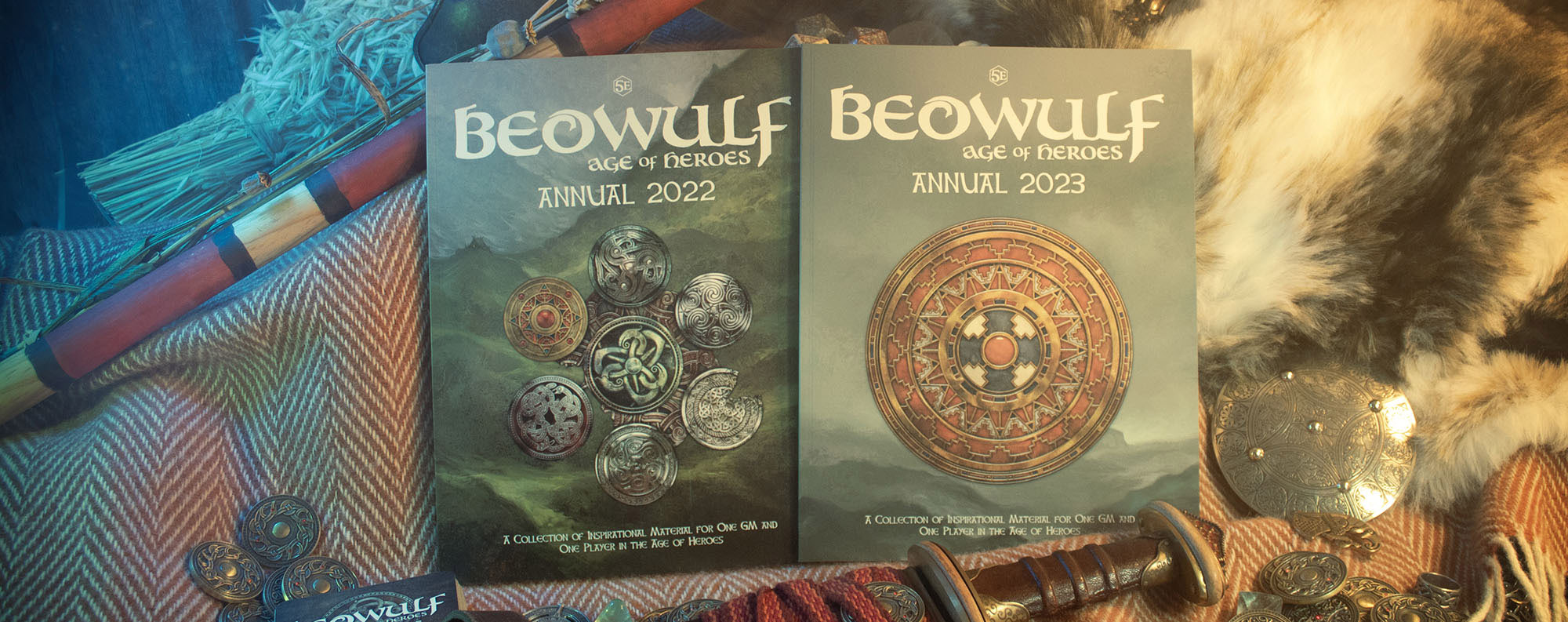
(Sign ups are open right now for the KING BEOWULF campaign, which launches on Tuesday 17th October)
When we first set about seriously nailing the aims of BEOWULF Age of Heroes, several themes came out:
To solve a problem for 5e players. We all liked 5e, but we knew “just another 5e book” wasn’t an option for us. It needed to identify something that players struggle with, and provide a solution. For BEOWULF, that’s duet play: the ability to have a satisfying 5e gaming session with one GM and one player. The delight in the voices of playtesters when they realised they need only find one other player to get a BEOWULF game going will stick with us forever!
We also wanted to make use of what we were good at: adapting source material, knowing a bunch about the early medieval period and the deep influences we learned about working on Tolkien games, as well as an aptitude for the kind of art Jon is known for.
KING BEOWULF is no different in this regard. We wanted to identify a problem and present an elegant solution, one which allows players to have more fun, and be more creative than ever before.
KING BEOWULF presented us with some unique challenges. We wanted to balance several factors:
- A continuation of the strong settings themes of BEOWULF
- Smart rules that people will want to borrow for other games
- A supplement that you hear about and want to try
- Something that’s fun and easy to play
The first port of call on that list is that we wanted to keep booking keeping to a minimum – the obvious choice is to go for a huge amount of complexity to try to simulate the day to day running of a kingdom. But there’s are several problem with this approach:
It runs the risk of being boring or laborious. We don’t necessarily want or need all the minutiae of every aspect of farming or moving goods from a to b in a given historical period. It is about RULERS not their accountants. It is also about mythic rulers, who were Heroes.
We wanted this to very much remain “The Age of Heroes”, and reflect the kind of rulership decisions we see in the poem of Beowulf or The Saga of Hrolf Kraki. These texts don’t get into “boring” logistical stuff, and we wanted to keep to the same path.
Thematically, we don’t really associate this era with copious book-keeping: an Italian citystates setting, where feuding merchant kings wage war with their ledgers as much as their mercenaries, might thrive with a complex accounting approach. Not so much BEOWULF! (Hopefully you’re hearing Ian Finney’s glorious voice over whenever you read BEOWULF. A match made in Valhol.)
There’s also a temptation to proliferate new systems. We have enjoyed some success with the system additions we made in BEOWULF, and the temptation is to do more. The danger then becomes making wholly new set of rules that 5e players don’t recognise and have to learn. We didn’t want to do that. KING BEOWULF is 5e. We just needed a clever way to make 5e do what we wanted it to.
And so KING BEOWULF uses a lot of things you already know how to do, and you’ll already have a good feel for how to assess your chances when taking decisions, making risks, and choosing which direction to take.
KING BEOWULF aims to provide an engaging and flavourful structure to a series of choices and checks, risks and rewards, that feel like running a kingdom as a mythic Early-Medieval ruler. The things you’re concerned with are cool and thematic.
Mechanical simplicity and elegance are really important in this regard. Our aim was to create easy to remember, easy to play procedures and rules that reduce all the potential for book keeping, endless rolling and tracking of tiny changes to some big headlines. That way, if you want to, you can add as much detail under those headlines as you want to, and you’ll have the freedom to be creative. KING BEOWULF will let you make YOUR kingdom, the way YOU want to.

It was also important that while there is a necessary amount of commitment in becoming a ruler, it shouldn’t ever punish your character, nor the player. For this we again return to the source material, and the idea that we should stick to the big mythic stuff rather than the minutiae of simulation.
As a ruler, your character can still go on adventures. Kingdom play is structured to be episodic and seasonal, which allows both the GM and the player space to play their campaign the way they want to. You can slot in as many “regular” Hero adventures as you want to. Theres a nod in the rules to absent rulers, and a kingdom does better when the player is fully engaged. But it’s not so punishing that they regret levelling up their campaign, and their treasured character in this way.
Being able to pause the campaign is also a goal. This means there needs to be some serious elegance in the rules so that if you come back to your Kingdom after a break, you can easily pick to where you left off.
KING BEOWULF launches on Kickstarter Tuesday 17th October. Sign up now to be notified on launch.
Download the free preview of KING BEOWULF here.


